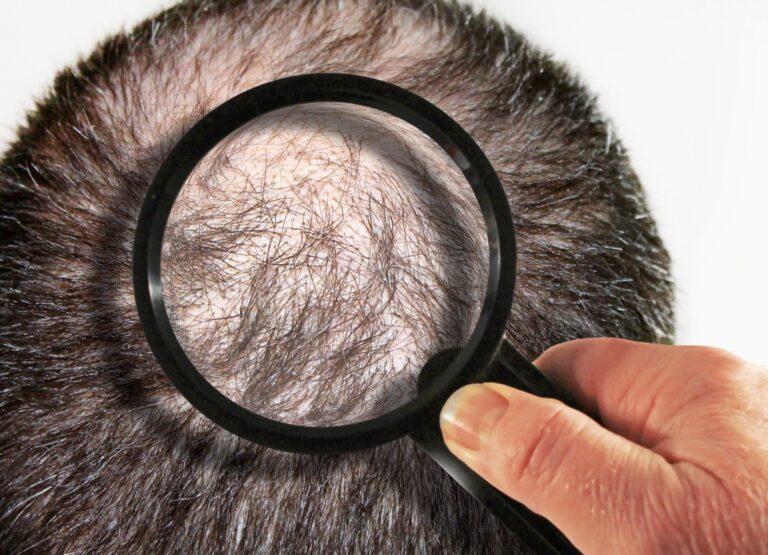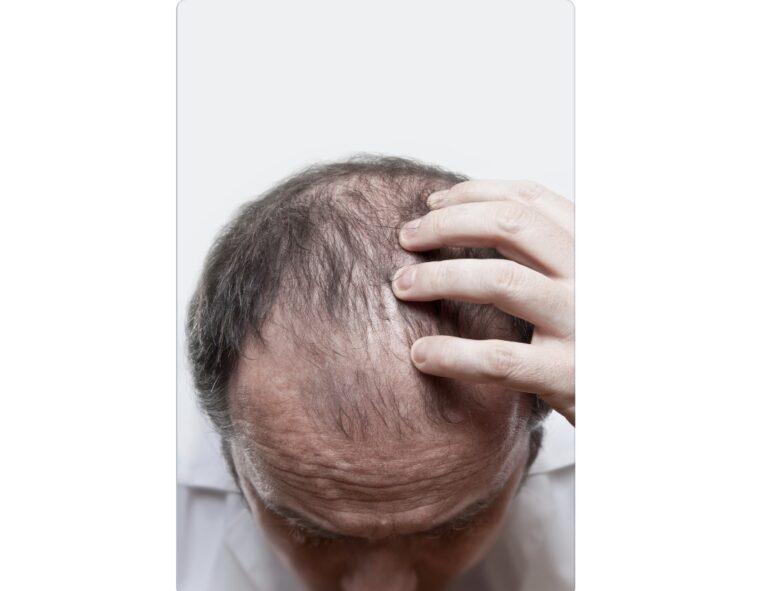
Is your hair looking and feeling a bit thin? Have you noticed it starting to go on top and recede at the front? If you have, that sounds like it’s probably male pattern baldness (MPB). Don’t stress though, it’s common and most guys get it at some point in their lives. You can even treat it these days.
Here’s a bit of the science. We’ll tell you about DHT, how it’s at the root of baldness and how DHT blockers can be used to fight MPB.
How do I know if I have male pattern baldness?
Male pattern baldness gets its name because men usually lose hair in a specific pattern. If you notice your hair thinning on the top of your head towards the back (your crown) and/or your hairline receding at the front of your head, particularly at the corners, then this could well be the first signs of MPB.
If other men in your family have MPB it makes it even more likely you’ll have it too, as it runs in families. If your dad or uncles or older brothers have MPB there’s a good chance you’ll develop it too. Read more about identifying MPB.
What causes male pattern baldness?
If you’ve been reading about this online you may have found it confusing and we don’t blame you. Some sites say MPB is caused by your genes, others by ageing, others by hormones like testosterone, others by a mixture, but often it isn’t very clear.
Scientists themselves are still debating the causes of MPB, and there’s still a lot to understand, which is why things aren’t always that clear, but that doesn’t mean we can’t make what we do know as clear and simple as possible.
DHT causes male pattern baldness
Most scientists believe that MPB is mostly caused by a hormone called dihydrotestosterone, or DHT for short. We say mostly as the science of MPB is complex and there are other factors involved, but DHT seems to be the main one. Let’s break this down:
What is DHT?
- DHT is a hormone, which is a type of molecule produced by glands in your body. Hormones are released by your glands, they travel your circulatory system and they bind with your organs to regulate how they work
- DHT is called a ‘male sex hormone’ or an ‘androgen’ because it plays a role in the development of male characteristics, like the growth of your penis and testicles during puberty, as well as the development of facial hair and pubic hair and a deeper voice
- DHT is made from the hormone testosterone. An enzyme called 5α-reductase (5-AR) converts around 5% to 7% of the testosterone in your body into DHT and this happens in certain tissues and organs, like in your genitals, skin, brain, liver and hair follicles
How does DHT cause male pattern baldness?
So DHT is a hormone which binds to organs in your body to affect how they work.
One type of organ DHT can bind to is called a hair follicle, which is a structure in your skin which produces hair. Free testosterone is converted to DHT in your hair follicles and then the DHT binds to the follicles at specific sites called receptors (think of the DHT molecule as a key and the receptor as a keyhole that matches the key). In most areas of your body the DHT encourages the follicle to grow a strand of hair.
But the hair follicles in your scalp are an exception. When DHT binds to the follicles in your scalp, it causes them to shrink. As the follicles shrink over time, they produce gradually shorter and finer hair, until the follicle eventually closes up and no hair is produced at all. This is why your hair thins with MPB before you go bald.
In really basic terms, DHT causes male pattern baldness by making the hair follicles in your scalp shrink. But why does this occur in some men more than others?
Do men with male pattern baldness have more DHT?
You’ll often hear or read that it’s not the amount of DHT a man has, but how sensitive his hair follicles are to it that determines whether or not he’ll develop MPB. The science isn’t so clear though, as men who have MPB also tend to have higher levels of DHT, so it may be a combination of more DHT and increased sensitivity to it.
Why does male pattern baldness run in families?
MPB is partly genetic, which means certain genes make it more likely you’ll develop MPB. These genes can be passed on to you from your parents.
There’s a lot of misinformation about this, both online and off, with a common myth being that you inherit the gene for MPB from your mother, so if your father has MPB you can’t be sure you’ll get it too. The truth is that MPB is more complex than this, with at least 250 genes involved, many of which come from both parents. If your father or other older male relatives have MPB you aren’t guaranteed to get it, but you are more likely.
Why some genes make it more likely you’ll develop MPB isn’t well understood (it’s insanely complex), but it’s likely to do with the receptors that DHT binds with. Certain genes may make the receptors in some men react more strongly to DHT.
Ageing and male pattern baldness
You also often see aging listed as a cause of MPB too. Although you’re more likely to develop MPB as you age, it’s not fully understood, particularly why levels of free testosterone usually fall as men age. It may be that more of the free testosterone we do have is converted to DHT as we age, or may just be that it takes time for hair follicles to shrink, so even if MPB starts in your teens it may take years for the effects to become visible.
How do i treat male pattern baldness
There are a range of ways to treat MPB, one of which is costly surgery.
But how do you reduce or lower DHT in your body? Well, another effective and less expensive option to treat MPB is to use a medication which reduces levels of DHT in the scalp, a so-called DHT blocker. So, what’s a DHT blocker? The clue is in the name really.
Finasteride, also sold under the brand name Propecia, is a prescription medication that stops the conversion of free testosterone into DHT in certain tissues, including the scalp. It can slow the rate of hair loss and even reverse MPB in most men.
A recap on DHT and male pattern baldness
We’ve just thrown a whole load of science at you here, so we’ll summarize it quickly to make it as clear as possible:
- Male pattern baldness is mostly caused by the hormone dihydrotestosterone (DHT). DHT is made from testosterone by the 5α-reductase enzyme in certain parts of your body, including in your hair follicles
- DHT binds with hair follicles and in most areas of your body the hormone encourages your hair to grow
- Your scalp is different though, as DHT here causes your hair follicles to shrink over time, making them produce steadily shorter and thinner hairs until eventually the follicle can’t produce any hair at all
- MPB is partly genetic. If other men in your family have MPB you’re more likely to have it too. This may be because you inherit genes that make the receptors in your follicles respond more aggressively to DHT
- You’re more likely to develop MPB as you age, even though your levels of free testosterone will probably fall, potentially because your body converts more testosterone to DHT
- You can treat MPB by using medications like Propecia and finasteride which stop testosterone being converted into DHT in your scalp. These medications can prevent baldness and can reverse it for most men
Sources
Medical Disclaimer
NowPatient has taken all reasonable steps to ensure that all material is factually accurate, complete, and current. However, the knowledge and experience of a qualified healthcare professional should always be sought after instead of using the information on this page. Before taking any drug, you should always speak to your doctor or another qualified healthcare provider.
The information provided here about medications is subject to change and is not meant to include all uses, precautions, warnings, directions, drug interactions, allergic reactions, or negative effects. The absence of warnings or other information for a particular medication does not imply that the medication or medication combination is appropriate for all patients or for all possible purposes.








